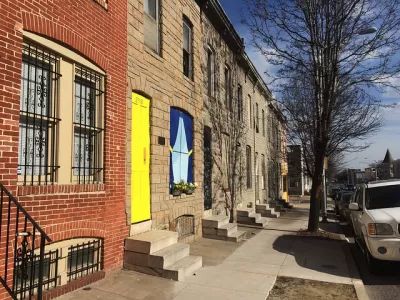A report from the Urban Land Institute calls for a multi-faceted approach to stabilizing the housing market and protecting tenants and homeowners.

A survey of tenants, advocates, and real estate professionals conducted by the Urban Land Institute (ULI) shows that most Americans support extending and institutionalizing assistance programs that helped people stay in their homes during the pandemic, writes Jason Plautz in Smart Cities Dive. One analysis shows that the federal eviction moratorium, struck down by the Supreme Court in August, led to 1.55 million fewer evictions than normal. A report released last week calls for a robust, multi-angle approach to stabilizing the "unsustainable" rental market and preventing further evictions and foreclosures.
According to Plautz, "all parties generally agreed that cities and states should implement or enhance programs that provide emergency assistance and long-term support to renters, increase housing supply and ensure safe and clean housing." Fewer respondents supported policies like rent control and zoning reform, which have stirred heated debates among local stakeholders as cities and states move to eliminate single-family zoning, encourage housing construction and density, and promote transit-oriented development. "One area that did see more consensus was the need to increase housing supply, both for renters and for first-time homebuyers," writes Plautz.
The report also suggests more innovative solutions such as community land trusts and housing cooperatives that can lower cost and put homeownership within reach of more households, particularly in communities of color that face added hurdles to finding affordable housing.
FULL STORY: To correct 'unsustainable' rental market, 'all of the above' policy needed: report

Maui's Vacation Rental Debate Turns Ugly
Verbal attacks, misinformation campaigns and fistfights plague a high-stakes debate to convert thousands of vacation rentals into long-term housing.

Planetizen Federal Action Tracker
A weekly monitor of how Trump’s orders and actions are impacting planners and planning in America.

Chicago’s Ghost Rails
Just beneath the surface of the modern city lie the remnants of its expansive early 20th-century streetcar system.

Bend, Oregon Zoning Reforms Prioritize Small-Scale Housing
The city altered its zoning code to allow multi-family housing and eliminated parking mandates citywide.

Amtrak Cutting Jobs, Funding to High-Speed Rail
The agency plans to cut 10 percent of its workforce and has confirmed it will not fund new high-speed rail projects.

LA Denies Basic Services to Unhoused Residents
The city has repeatedly failed to respond to requests for trash pickup at encampment sites, and eliminated a program that provided mobile showers and toilets.
Urban Design for Planners 1: Software Tools
This six-course series explores essential urban design concepts using open source software and equips planners with the tools they need to participate fully in the urban design process.
Planning for Universal Design
Learn the tools for implementing Universal Design in planning regulations.
planning NEXT
Appalachian Highlands Housing Partners
Mpact (founded as Rail~Volution)
City of Camden Redevelopment Agency
City of Astoria
City of Portland
City of Laramie





























